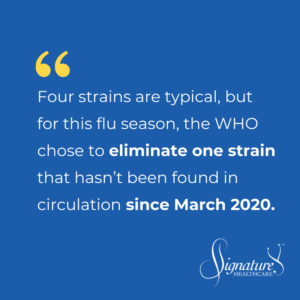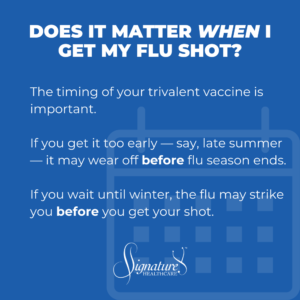Avoid the Flu: Who Should Get the New Trivalent Vaccine?
Time for your flu vaccine?
This year’s inoculation is different: It’s a trivalent, meaning it contains three strains of virus, unlike the usual four-strain quadrivalent.
So, what does that mean? Let’s address a few questions about this year’s trivalent vaccine:
How does the World Health Organization (WHO) decide what strains to include in each year’s flu vaccine?
WHO scientists identify the strains of influenza virus that have affected the most people most recently and are likely to circulate again in the next flu season (autumn and winter in the Northern Hemisphere).
They integrate the selected strains into each annual vaccine to help patients strengthen their immunity against multiple forms of the flu virus.
Why does this year’s vaccine only include three strains instead of the usual four?
Four strains are typical, but for this flu season, the WHO chose to eliminate one strain that hasn’t been found in circulation since March 2020.

How effective is the new trivalent vaccine in preventing the flu? What influences its efficacy each year?
Until flu season is underway, we can’t predict the effectiveness of this year’s trivalent vaccine.
Viral strains shift from year to year, but data shows that flu vaccines are typically 40–60% effective at preventing influenza disease when the viruses chosen for the annual vaccine closely match circulating viruses.
Is the flu shot especially advised for particular individuals?
The main targets to be immunized against influenza are people at:
- Highest risk of developing severe disease. This includes children under five years old, as well as adults 65+ (particularly those over age 75, who have a much higher risk of illness and death from the flu).Unfortunately, these same groups often don’t respond as well to the influenza vaccine. Neither do people with certain immune disorders or who take medications that affect the immune system.
- Highest risk of spreading severe illness to others. We prioritize vaccinating parents, caregivers, and healthcare personnel who come in close contact with high-risk individuals and may easily spread illness to them.
Should a relatively healthy mid-40s adult get the trivalent vaccine?
If you’re a young or middle-aged adult with an average risk of flu, that 40–60% flu prevention rate can be beneficial, especially coupled with a healthy adult’s typically strong immune response to the shot.
And if you happen to catch the flu anyway, you’ll likely find its effects are much less severe. You’ll also recover faster, so you can return to work, care for your family, take your vacation, or attend important events as planned.
Also important: When you get vaccinated, you’re less likely to infect other susceptible people.
Do flu vaccines have any common side effects or rare but serious risks?
The most common side effect of influenza vaccination is a local reaction to the vaccine — discomfort or achiness at the injection point, typically lasting less than two days.
Less commonly, you may feel a day or two of generalized fatigue, body ache, headache, and/or a low-grade fever as your body adjusts to the vaccine. These symptoms aren’t cause for alarm. If you feel them, prioritize rest until they pass.
A more serious side effect of influenza vaccination is Guillain-Barré syndrome, which can cause ascending weakness and numbness in the body. It occurs extremely rarely (one case in a million).

Does it matter when I get my flu shot?
Yes! The timing of your trivalent vaccine is important. If you get it too early — say, late summer — it may wear off before flu season ends. If you wait until winter, the flu may strike you before you get your shot.
I recommend getting a flu shot in September/October, just before the main flu season but late enough in the year to last well into spring.
Are there flu shot variants for different people?
Different types of influenza vaccinations are available, and the choice depends on the individual. For instance, people allergic to eggs can’t receive certain vaccines.
Some are best suited for people under 65, some for 65+ — at Signature Healthcare, we stock both. High-dose and adjuvanted vaccines have special properties that help improve immune response in people over 65.
Ready for your trivalent vaccine?
At Signature Healthcare, we recommend the annual flu shot to everyone who can receive it. We administer vaccines because they’re safe, effective, and important to your health, your family’s, and the entire community’s.
So, are you ready for this year’s trivalent vaccine? Call your Signature Healthcare doctor to schedule your shot.
Still curious about potential side effects? We’ll put your mind at ease about the trivalent vaccine’s benefits.

Dr. Debra Gazzuolo, MD
Dr. Gazzuolo is board-certified in internal medicine.
She grew up in the Atlanta area, graduated summa cum laude from Georgia Tech, and received her medical degree from Washington University in St. Louis. She completed her residency in internal medicine at University of Pittsburgh Medical Center where she subsequently joined the faculty in the Department of Medicine and served as Assistant Clinical Professor for six years prior to moving to the Charlotte area. Through her academic and teaching experience, Dr. Gazzuolo earned the rank of Fellow in the American College of Physicians. Areas of special interest include diabetes, cancer screening, women’s health, and preventive care. She enjoys playing tennis, traveling, and spending time with her husband and daughter.
Get the latest News
Join the Signature Healthcare Newsletter to get the latest articles, resources, and news delivered directly to your inbox.

